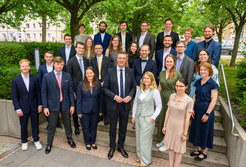The Limits of Moral Courage: How Far May Taking the Law into Your Own Hands Go?
Innovative criminal law approach earns Florian Slogsnat an Otto Hahn Medal
Legal scholar Florian Slogsnat has been awarded the Otto Hahn Medal by the Max Planck Society for his doctoral thesis, Rechtfertigender Notstand im demokratischen Rechtsstaat. Der Vorrang staatlicher Verfahren bei § 34 StGB [Justifying Necessity in Democratic States Governed by the Rule of Law – the Primacy of State Procedures in Cases of Sec. 34 of the German Criminal Code]. In his research, Slogsnat develops a differentiated framework to delineate the emergency powers of private individuals from state procedures. In addition, he is being recognized with the Otto Hahn Award, opening up the opportunity of returning to the Max Planck Institute for the Study of Crime, Security and Law as a research group leader.

Especially in times of crisis, democratic societies rely on the moral courage of individuals. But what are the limits for private individuals who take the law into their own hands, potentially committing criminal offenses in the process? Which conflicts can they resolve “at their own discretion,” and which must be left for the state to address?
In Germany, the concept of necessity as justification pursuant to Section 34 of the German Criminal Code (StGB) is relevant in this context. According to this provision, an act may go unpunished under certain circumstances if it was necessary in accordance with certain criteria. At the same time, these private emergency powers are counterbalanced by various institutionalized conflict resolution mechanisms, such as police intervention or civil court proceedings. So where exactly is the line between private emergency powers and state procedures?
While case law and literature cover a wide variety of criteria, these overlap and contradict each other in some cases. Florian Slogsnat’s dissertation brings together multiple theories, subject areas, and academic traditions to develop a differentiated framework, which he underpins with a large number of concrete case studies. The jury concluded that the criteria he developed will help resolve many future cases under Section 34 StGB.
Florian Slogsnat was a doctoral researcher at the Criminal Law Department of the Max Planck Institute for the Study of Crime, Security, and Law in Freiburg, Germany, from 2020 to 2023. His work was supervised by Tatjana Hörnle, Director of the Institute and Head of the Criminal Law Department. He is currently completing his legal preparatory service at the Regional Court of Tübingen.
Since 1978, the Max Planck Society has annually awarded the Otto Hahn Medal to up to 30 young researchers for outstanding scientific achievements related to their dissertations. The award is endowed with 7,500 euros.
Particularly worthy recipients of the Otto Hahn Medal receive the Otto Hahn Award, which provides for a long-term research residency abroad, followed by leadership of a small research group at one of the Max Planck Institutes. The award is intended to pave the way for a long-term academic career in Germany.


